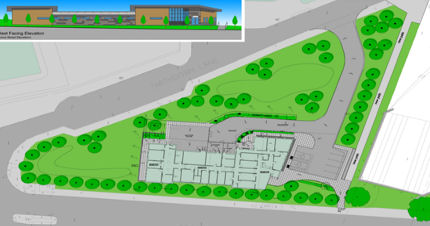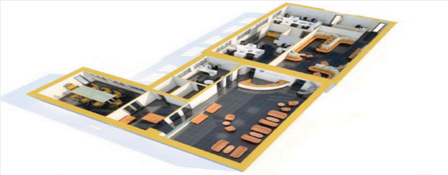The University’s £10M investment in the development of the Veterinary School is nearing completion – and staff will begin to move into their new premises from July onwards.
The School has undergone a major redevelopment and now boasts a newly designed School home, a larger teaching suite at Great Newton Street, new facilities for the small animal practice and enhanced research facilities at Liverpool Science Park (LSP). The new Veterinary School home will be in the Thomson Yates Building, which has been redesigned to provide School offices, a social learning zone for students, a committee room and an open space for staff and students meetings and events such as open days. Hot desk space will be provided for staff who have their base at Leahurst or elsewhere on the Liverpool campus and have teaching commitments within the school.
A new Veterinary Teaching Suite, based in Great Newton Street, will provide a practical teaching space for up to 150 students on the first floor with associated technical areas for resource developments. In addition, a new clinical skills area will be available on the ground floor which enables the School to develop the BVSc curriculum in line with the requirements of accrediting bodies. Staff will move the summer, ready to welcome students at the start of the new academic year.
Professor Susan Dawson, Head of the Veterinary School, said: “We’re really excited about the move to the new teaching suite, the facilities are superb and will give our students a modern and flexible learning space designed to support world-class veterinary education. The move increases teaching capacity which will enable us to meet growing demand for courses”
A first opinion small animal practice is being built close to the site of the existing practice. The facility is required for clinical teaching for the veterinary students and the close proximity of the new premises will ensure that client service is maintained and there is no detrimental impact on the business.
In addition, a new Pathology Suite is being developed at the Leahurst campus, on the Wirral. The existing post-mortem room at the Leahurst campus has undergone substantial renovation and a second post-mortem facility will be completed this year. Associated laboratory facilities for histology sample preparation and electron microscopy and additional office space will complete the pathology accommodation – and allow all pathology activity to take place on one site.
The Department of Infection Biology, which is partly based in the current Crown Street building, is to move to move into bespoke laboratories within the Liverpool Science Park (LSP) in July. The custom built facility on Brownlow Hill will see researchers occupy more than 8,000 sq ft of state-of-the art laboratories and offices and bring together over 40 infectious disease researchers working on parasitic, bacterial and viral diseases of animals.
Professor Jonathan Wastling, Head of Infection Biology, said: “Liverpool has always had a strong reputation in veterinary infectious diseases research and this development reflects those strengths by providing a major investment into high quality research facilities. These new custom-designed laboratories will further strengthen our position and maintain veterinary infectious disease research at the heart of the city campus”.
Other research groups currently based in Crown Street will move into existing facilities within the Faculty in the Biosciences and the Duncan buildings “in-line with the Faculty’s strategy to bring human and animal disease research closer together” said Professor Wastling.
Additional refurbishment of research laboratories is also underway at the Veterinary School’s Leahurst campus.
Director of Facilities Management, Steve Dickson, commented: “We are pleased that we have been able to deliver significant investment through a capital programme spread across a number of locations that meets stakeholders’ expectations and supports the key strategic goals for both the Veterinary School and University within what has been a very challenging timeframe”
For information on the Veterinary School see: www.liv.ac.uk/veterinary-science. For more information on capital developments see www.liv.ac.uk/facilities-management/

